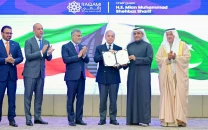New universities bill: Universities fear politics will seep into everything
KU teachers’ association to meet today and devise future plan of action.

KU teachers’ association to meet today and devise future plan of action. ILLUSTRATION: JAMAL KHURSHID
Soon after the Sindh Assembly slipped in an amendments to the universities acts along with its controversial local government law, the universities in Sindh began to fear the consequences of the new act.
All public-sector universities are afraid that the latest amendment, which gives more power to the provincial government in university affairs, will politicise these institutions even further.
For Karachi University Teachers Society’s president, Dr Mutahir Ahmed, the newly enacted Sindh Universities Law (Amendment) Bill, 2013, betrays the fundamental concept of a university, which allows them to exercise a great deal of autonomy in their academic and administrative affairs with help of democratically elected statutory bodies, senate and syndicate.

“The executive committee of the KU teachers’ society concluded on Wednesday that this amendment bill is a measure to usurp the autonomy of universities by rendering all the internal statutory bodies worthless,” Dr Ahmed told The Express Tribune. “These amendments will end up politicising almost all academic and administrative affairs.”
These amendments render the administrative posts, including that of the vice-chancellor, redundant, he said. “The most a vice-chancellor will be able to do is appoint lower-level staff, clerks and janitors.”
The teachers’ society, in view of serious reservations on the newly enacted bill, has called an emergency meeting of its general body today (Friday) to draw up a joint strategy. The meeting will be followed by a meeting with the Sindh chapter of the Federation of All Pakistan Universities Academic Staff Associations on August 29, following which teachers will present their joint demands.

Even the teachers who were struggling to reform the outmoded laws regulating government universities took this amendment as a blow to their endeavours. They have particularly been irked by the way the universities’ syndicates are shorn of their appointment authority. “While we welcome certain provisions, the law has done more damage than good,” said Dr Azhar Ali Shah, Sindh University Teachers Association general secretary.
For the teachers, the law has usurped the syndicate’s authority to appoint the registrar, the controller of exams, chief accountant and other officials down to the rank of BPS-16. “This will, in fact, politicise the university administration and, consequently, the whole academia.”
Dr Shah met Sindh law minister Dr Sikandar Mandhro last month and put forward his recommendations to improve the law. But he was surprised that Mandhro did not inform him that such a law with largely counterproductive provisions was on the anvil. “We wanted the law to lay down a transparent procedure to appoint vice-chancellors, transfer NOC issuance authority from the governor to the VCs and set up a depoliticised syndicate, besides other reforms,” he explained.
Dr Arshad Memon, general secretary of the teachers association at Mehran University of Engineering and Technology, said the representatives from all the government universities will meet in the coming days to formulate a response.
Nevertheless, the teachers appreciate the new admissions policy, which will provide equal opportunity to students from the 22 districts of Sindh to get enrolled in Karachi universities.
Meanwhile, upholding the status of universities as higher seats of learning was something the University of Karachi vice-chancellor, Prof. Dr Muhammad Qaiser, insisted on. “Their autonomy should not be undermined in any way.”
The newly enacted law states the university’s admission policy will be decided by the government instead of the university’s academic council, which is a matter of concern, he pointed out. “What was the purview of the university’s statutory bodies in deciding their internal affairs in a free and fair manner, this new law appears to chip away at this very practice.”
NED University of Engineering and Technology vice-chancellor Prof. Dr Afzalul Haque agreed. “I do not know how this can happen and what the actual motives are,” Dr Haque said, appearing surprised at the contents of the bill. “It is like degrading the higher seats of learning to the level of schools and colleges by enforcing an authoritarian rule.”
According to him, the amendments will end up disintegrating governance at universities. “When universities will have no say in matters pertaining to admissions and appointments above grade 16, then there is no point in calling them universities.”
Published in The Express Tribune, August 23rd, 2013.



















COMMENTS
Comments are moderated and generally will be posted if they are on-topic and not abusive.
For more information, please see our Comments FAQ